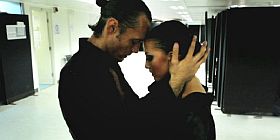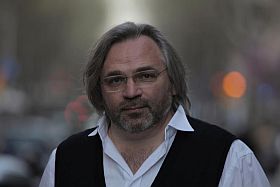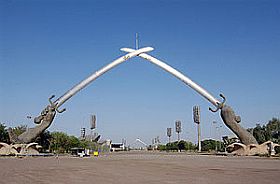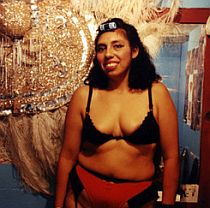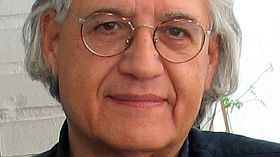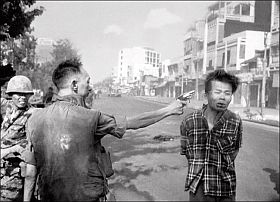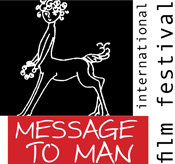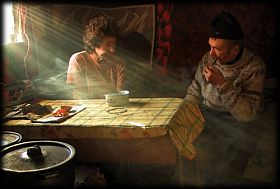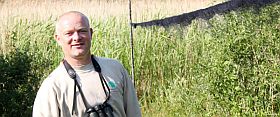No, I did not see the pyramids or the Egyptian Museum. Yes, I saw the Nile from my hotel and had a quiet wonderful boat trip late night on the river. Yes, I crossed the Tahrir Square every morning on the way to the venue of the workshop, I attended as a tutor. And I saw how the street entrance to the American Embassy was blocked with huge stones. But on the tuesday morning where the workshop started, everything had calmed down after days of riots due to the film, everyone talks about but few have seen, including me.
So there was little, actually no time for seeing the sights but time dedicated to see filmmakers with documentary projects under the umbrella of the Crossroads film programme initiated and run by AFAC (The Arab Fund for Arts & Culture). A film programme so much needed – as the manager of the programme, Rima Mismar, wrote to me in the invitation letter, ”launched a year ago to support emerging filmmakers from the Arab world working on projects related to “possibility” and “change”… for young filmmakers who represent an exceptional talent cross-section from our region”.
As one who has followed the changes in the Arab world during the last year(s) this initiative is to be so much welcomed after news clips, and reportages, and the many documentaries, many of them good it has to be said, made by non-Arab filmmakers.
Back to Cairo and the workshop where you as a tutor arrive having read the projects, knowing a couple of them in beforehand, curious to meet the makers, talk to them, see material, see previous work – to try to have an impression that can form the basis for feedback the filmmakers can profit from. Of course it goes both ways, the filmmakers should know who you are. It always helps to talk about something that has nothing to do with the film to be done.
It was at the Cinematheque the workshop took place. Situated in an old, pretty worn, decadently beautiful art nouveau building, 8 floors, a charming hotel on the top floor, and, if I got it right, the plan is to have three floors dedicated to
film – the Cinematheque, production companies, facilities etc.
First meeting – with Mohamed Rashad, from Alexandris, whose first long documentary project “The Little Eagles” is a fascinating generation story built primarily on the relationship between the director and his father, an orderly and ordinary Egyptian worker, who was never politically active but an always very well informed citizen, taking care of family and work. Who is now worried about his son, who – contrary to his friends whose parents were “little eagles”, politically active in the 70’es – got involved in the revolutionary activities in the Tahrir. By chance because “revolution. I am not sure why. Maybe because the word is alien to me. I am not used to it. It was never in my vocabulary. I do not know who called it, a revolution. Maybe it’s one of those I want to make a film about. It’s one of the words they were brought up to appreciate. They (the friends, ed.) were raised to read books about revolutions, communism, socialism, “Karl Marx”, “Maxim Gorky”, “Sheikh Imam’s songs”, “Ahmed Fouad Negm’s poetry.”
Apart from having an impressive knowledge of high-class Danish ceramics design (!), especially Søholm, from the island of Bornholm, Lebanese freelance photo reporter and cameraman, cultural project coordinator AND film director Fadi Yeni Turk talked me into understanding that his “Monumentum” was not, as I wrongly suggested at the beginning, of our meeting, until I saw previous work clips, a three part series about monuments and their history in squares in Beirut, Bagdad and Manama in Bahrein. What he offers is an original, intelligent, essayistic documentary: “
“Within a very special context for the Arab world these days, where the Monument is still to be destroyed, adapted or reconstructed and has yet to become common heritage, “Monumentum” wants to bet that these social, historical and political issues can be representable, should be even represented beyond their abstraction and complexity; the film goes beyond the apparent paradox of wanting to seize through cinema, an art of movement “par excellence”, what specifically seeks to lay, immobilize, simplify history: the public monument.” Photo: The Victory Arch in Baghdad erected by Saddam Hussein.
I had met with Sara Ishaq before (at the Edinburgh Pitch) and can only repeat my admiration and high expectations to this film, that in the following months will be at the editing phase. I have seen wonderful material from a story that has a universal appeal with its focus on three generations. The best I can do is to quote the exposé of the young filmmaker:
“After four years of complete disconnection from my Yemeni roots and tentative family ties, I travel back to Yemen. The story follows my endeavour to craft a single identity for myself between my dual Yemeni and Scottish backgrounds. Little did I know, however, that Yemen itself was grappling with its own identity crisis and struggle for freedom. The film is a personal story, which begins as a reunion between estranged family members and develops into an all-engulfing popular uprising. It focuses on the shifting dynamics between women and men within the context of a modern Yemeni family, testing all preconceived ideas about identity, social customs, familial and social bonds as women’s roles and input become increasingly integral to the Yemeni revolution.” Title “Father Land”.
In workshops like this projects are at different stages of development. Egyptian Mohammad Shawky Hassan was in New York during the revolution, listened to the radio news and wants to make a film that (maybe, I am still thinking about how, he told me) “is made up of 10 to 15 panoramic shots of empty indoor and outdoor spaces in New York City and one in Cairo, with the character “A” framed in each almost motionless, carrying out a basic physical activity. Each shot will be a 360-degree slow extreme wide pan revealing details of the filmed space. The Arabic soundtrack is placed over the images, with English subtitles.” I saw two of the director’s previous films, we talkes about Jørgen Leth and Roy Anderson, and I have no doubt that we will see an interesting, creative and playful film from his hands.
The same goes for – yes, I am very positive to all the projects, carefully selected by the people at AFAC – Bahïa Bencheik El Fegoun, Algerian director with a producer, also Algerian, who has an office in Paris. Her film project, named “Algerians, State of Affairs, State of Mind…”, is intriguing, not only because we hear so little from the country, but also because the director in her writing shows original narrative visions from this personal starting point:
“Sometimes, it takes a special occasion for an individual and a word to truly meet. What I mean by this is that one encounters a lot of words in a lifetime, but some words we understand at first glance and some others we never really understand despite our lifelong interaction with them.” This paragraph beautifully and accurately expresses the situation in which we, the word revolution and I, are today; our encounter, our true encounter, will take place in this movie.”
For a year the director has – day by day – gathered notes and news, written or visual – on what happened in the country in terms of riots, demonstrations and other means of opposition. She wants to use that as the backbone of the film introducing three revolutionary, non-violent characters of great charisma.
Also Jasmina Metwaly and Philip Rick – Polish/Egyptian and German/Egyptian – has clearly had their project chosen due to their original ambition, read their intro text:
“Workers are in need of their body, they need it to work, they need their working spaces (exterior bodies) to exist, but they can’t do it without their dignity. Workers need their voice to be heard, not only as a collective roar, but individually. This is a film about workers. Throughout the ongoing Egyptian Revolution some workers have lost a relative or friend, most continue to be exploited by factory owners and many are fighting back and resisting. This film mixes the forms of documentary and fiction in order to see the Egyptian revolution from workers’ perspective beyond the factory’s heavy gates, beyond the frozen assembly lines and rusty machinery. We want to challenge both the visual discourse of the role of workers in film, as well as the political narrative of whom this revolution is made up of in Egypt.”
Brechtian theatre director and script writer Hanaa Abdel Fattah will take part in the (filmic) dramatization of the filmic documentation the two directors intend to do, Mostafa Youssef is the producer with his newly founded company Seen Films, based in Cairo. The company is also part of the production of “Father Land”, see above.
The seventh filmmaker I met is from Syria. He/she showed strong material from a very personal point of view. No more do I wish to write about the film project, the actual situation in the country taken into consideration.
AFAC intends to follow the filmmakers during the process of development/production/distribution, first finished films to be waited during 2013, two fiction films are also on the list – AFAC gives the full package, Bravo!
Apart from the Crossroads Programme AFAC has for years run a Documentary Programme, this text is taken from the website of the Fund: The Arab Documentary Film Program (ADFP), a partnership with the Sundance Institute, aims to be a launch pad for documentary filmmakers, providing them with the financial and professional resources to create influential work that is globally recognized. During each cycle of the ADFP, around 15 feature-length documentary projects in the script/development (up to US$15,000 per project) and production/post-production (up to US$50,000 per project) stages are awarded grants worth up to $500,000. In addition to providing direct funding, Sundance and AFAC cooperate with renowned international festivals or institutions to bring together grantees with experts and industry professionals to provide tailored support, consultation and networking opportunities.
www.arabculturefund.org




